In the booming compact SUV segment, the Ford Puma and MG ZS stand out as popular choices among drivers seeking style, convenience, and performance. This article delves into a detailed comparison of these two vehicles, evaluating their technical specifications, innovative features, and overall value for money.
Ford Puma vs MG ZS – Differences & prices compared
Both models have their strengths – but which one suits you more?
Compare performance, efficiency, price and space directly: Ford Puma or MG ZS?
Design and Dimensions
The Ford Puma presents a sleek and modern silhouette, measuring between 4186 mm and 4226 mm in length, with a width of 1805 mm and a height of up to 1555 mm. Its dynamic design features a sporty front grille, LED headlights, and pronounced wheel arches, giving it an aggressive stance on the road.
On the other hand, the MG ZS offers a more robust appearance with dimensions ranging from 4323 mm to 4430 mm in length, a width of 1809 mm to 1818 mm, and a height of 1635 mm to 1649 mm. The ZS’s design incorporates sharp lines and a bold front fascia, making it a standout in urban environments.
Performance and Engine Specifications
The Ford Puma is available with a range of engine options, including petrol MHEV and electric variants. The petrol engines deliver impressive power outputs of up to 168 HP while maintaining a low fuel consumption of between 5.4 L/100km to 6 L/100km. The electric model offers a range of up to 376 km with a battery capacity of 43 kWh.
In comparison, the MG ZS is equipped with 1.5L petrol and electric full hybrid engines. The electric version achieves a top power of 197 HP with a fuel consumption as low as 5 L/100km and an electric range of up to 440 km using a 65.7 kWh battery. The ZS performs admirably with an acceleration of 0-100 km/h in just 8.6 seconds for its electric model.
Interior Comfort and Technology
Inside the Ford Puma, drivers will find a spacious cabin designed for comfort, boasting ample legroom and a trunk capacity ranging from 456 L to 523 L. The vehicle is well-equipped with the latest technology, including an intuitive infotainment system featuring a touchscreen display, smartphone integration, and advanced safety features such as adaptive cruise control and lane-keeping assistance.
The MG ZS also offers a comfortable interior with a trunk capacity of 443 L to 448 L. It comes with a user-friendly infotainment system, including a digital display, smartphone connectivity, and various driver assistance features that enhance safety and convenience on the road. The modern finishes and spaciousness make it an appealing option for families.
Driving Experience and Handling
The Ford Puma is praised for its dynamic driving characteristics, supported by its front-wheel-drive configuration and options for both manual and automatic transmissions. The nimble handling and responsive steering make it enjoyable to drive, especially through winding roads.
In contrast, the MG ZS offers a solid, comfortable ride with responsive handling. Its electric and hybrid models provide a quiet driving experience, with snappy acceleration and smooth power delivery thanks to the automatic transmission. The ZS is particularly well-suited for city driving, making it easy to navigate through congested streets.
Conclusion: Which SUV Reigns Supreme?
When comparing the Ford Puma and MG ZS, both vehicles offer compelling features that cater to the needs of modern drivers. The Puma provides a sportier ride, cutting-edge technology, and a variety of engine options. Meanwhile, the ZS shines with its hybrid efficiency, generous electric range, and affordability.
Your choice will ultimately depend on your driving preferences and lifestyle needs. Whether you value performance and style in the Ford Puma or practicality and efficiency in the MG ZS, both SUVs deliver on their promise, making them worthy contenders in today’s competitive automotive landscape.
Here’s where it gets real: The technical differences in detail
Costs and Efficiency:
Looking at overall running costs, both models reveal some interesting differences in everyday economy.
MG ZS has a clearly perceptible advantage in terms of price – it starts at 18000 £, while the Ford Puma costs 24800 £. That’s a price difference of around 6780 £.
Fuel consumption also shows a difference: MG ZS manages with 5 L and is therefore barely noticeable more efficient than the Ford Puma with 5.40 L. The difference is about 0.40 L per 100 km.
Engine and Performance:
Power, torque and acceleration are the classic benchmarks for car enthusiasts – and here, some clear differences start to show.
When it comes to engine power, the MG ZS has a somewhat edge – offering 197 HP compared to 168 HP. That’s roughly 29 HP more horsepower.
In acceleration from 0 to 100 km/h, the Ford Puma is slightly quicker – completing the sprint in 7.40 s, while the MG ZS takes 8.70 s. That’s about 1.30 s faster.
In terms of top speed, the Ford Puma performs slightly better – reaching 210 km/h, while the MG ZS tops out at 179 km/h. The difference is around 31 km/h.
There’s also a difference in torque: Ford Puma pulls clearly stronger with 290 Nm compared to 148 Nm. That’s about 142 Nm difference.
Space and Everyday Use:
Whether family car or daily driver – which one offers more room, flexibility and comfort?
Both vehicles offer seating for 5 people.
In curb weight, Ford Puma is minimal lighter – 1316 kg compared to 1330 kg. The difference is around 14 kg.
In terms of boot space, the Ford Puma offers a bit more room – 523 L compared to 443 L. That’s a difference of about 80 L.
In maximum load capacity, the MG ZS performs to a small extent better – up to 1457 L, which is about 174 L more than the Ford Puma.
When it comes to payload, MG ZS hardly perceptible takes the win – 470 kg compared to 469 kg. That’s a difference of about 1 kg.
Who comes out on top?
Overall, the MG ZS shows itself to be wins the duel decisively and secures the title of DriveDuel Champion.
It convinces with the more balanced overall package and proves to be the more versatile choice for everyday use.
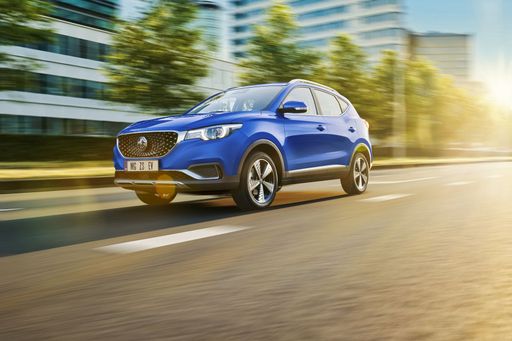 @ MG Motor / SAIC Motor Corporation
@ MG Motor / SAIC Motor Corporation
MG ZS
Ford Puma
The Ford Puma is a cheeky compact crossover that blends sporty styling with city-friendly practicality, giving drivers a surprisingly fun and composed ride. With clever storage tricks and a lively personality, it’s a smart pick for buyers who want enjoyment without fuss.
details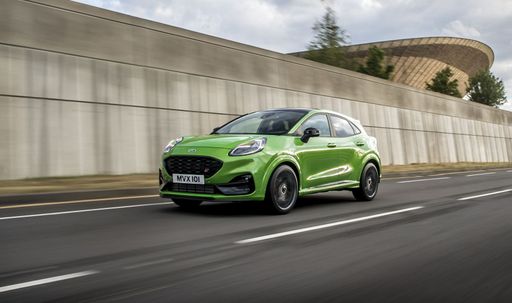 @ Ford Motor Company / Ford Media Center
@ Ford Motor Company / Ford Media Center
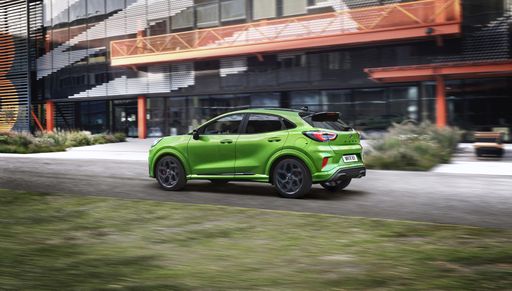 @ Ford Motor Company / Ford Media Center
@ Ford Motor Company / Ford Media Center
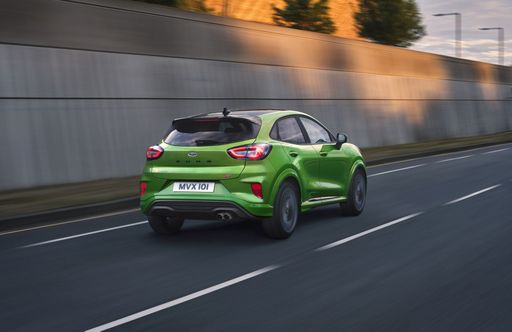 @ Ford Motor Company / Ford Media Center
@ Ford Motor Company / Ford Media Center
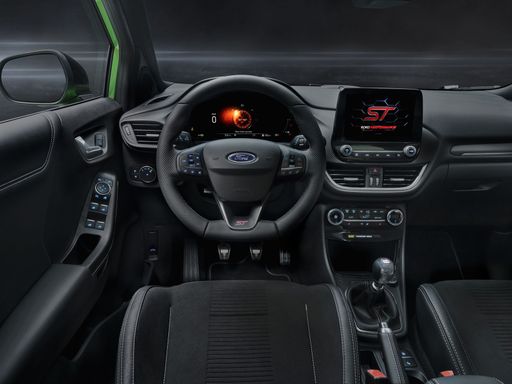 @ Ford Motor Company / Ford Media Center
@ Ford Motor Company / Ford Media Center
MG ZS
The MG ZS arrives as a cheeky and practical choice for shoppers who want SUV style and family-friendly space without blowing the budget. It may not pretend to be premium, but with sensible equipment, easy-to-live-with driving manners and surprising value, it makes a persuasive case for anyone after sensible transport with a bit of personality.
details @ MG Motor / SAIC Motor Corporation
@ MG Motor / SAIC Motor Corporation
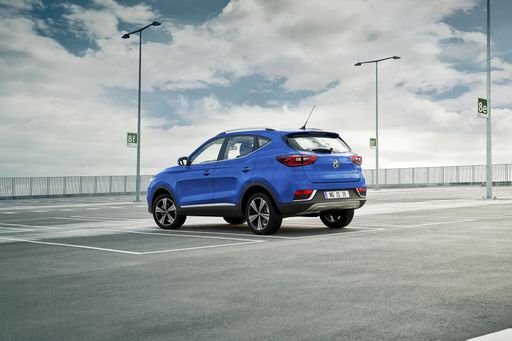 @ MG Motor / SAIC Motor Corporation
@ MG Motor / SAIC Motor Corporation
 @ MG Motor / SAIC Motor Corporation
@ MG Motor / SAIC Motor Corporation
 @ MG Motor / SAIC Motor Corporation
@ MG Motor / SAIC Motor Corporation
 @ MG Motor / SAIC Motor Corporation
@ MG Motor / SAIC Motor Corporation
 @ Ford Motor Company / Ford Media Center
@ Ford Motor Company / Ford Media Center
|
 @ MG Motor / SAIC Motor Corporation
@ MG Motor / SAIC Motor Corporation
|
|
|
|
Costs and Consumption |
|
|---|---|
|
Price
24800 - 36300 £
|
Price
18000 - 23100 £
|
|
Consumption L/100km
5.4 - 5.9 L
|
Consumption L/100km
5 - 6.5 L
|
|
Consumption kWh/100km
13.1 - 13.9 kWh
|
Consumption kWh/100km
-
|
|
Electric Range
361 - 376 km
|
Electric Range
-
|
|
Battery Capacity
43 kWh
|
Battery Capacity
-
|
|
co2
0 - 135 g/km
|
co2
113 - 145 g/km
|
|
Fuel tank capacity
42 L
|
Fuel tank capacity
41 - 55 L
|
Dimensions and Body |
|
|---|---|
|
Body Type
SUV
|
Body Type
SUV
|
|
Seats
5
|
Seats
5
|
|
Doors
5
|
Doors
5
|
|
Curb weight
1316 - 1563 kg
|
Curb weight
1330 - 1420 kg
|
|
Trunk capacity
456 - 523 L
|
Trunk capacity
443 L
|
|
Length
4186 - 4226 mm
|
Length
4430 mm
|
|
Width
1805 mm
|
Width
1818 mm
|
|
Height
1550 - 1555 mm
|
Height
1635 mm
|
|
Max trunk capacity
1216 - 1283 L
|
Max trunk capacity
1457 L
|
|
Payload
367 - 469 kg
|
Payload
375 - 470 kg
|
Engine and Performance |
|
|---|---|
|
Engine Type
Electric, Petrol MHEV
|
Engine Type
Full Hybrid, Petrol
|
|
Transmission
Automatic, Manuel
|
Transmission
Automatic, Manuel
|
|
Transmission Detail
Reduction Gearbox, Manual Gearbox, Dual-Clutch Automatic
|
Transmission Detail
Automatic Gearbox, Manual Gearbox
|
|
Drive Type
Front-Wheel Drive
|
Drive Type
Front-Wheel Drive
|
|
Power HP
125 - 168 HP
|
Power HP
116 - 197 HP
|
|
Acceleration 0-100km/h
7.4 - 9.8 s
|
Acceleration 0-100km/h
8.7 - 12.5 s
|
|
Max Speed
160 - 210 km/h
|
Max Speed
168 - 179 km/h
|
|
Torque
170 - 290 Nm
|
Torque
148 Nm
|
|
Number of Cylinders
3
|
Number of Cylinders
4
|
|
Power kW
92 - 124 kW
|
Power kW
85 - 145 kW
|
|
Engine capacity
999 cm3
|
Engine capacity
1495 - 1498 cm3
|
General |
|
|---|---|
|
Model Year
2025
|
Model Year
2024 - 2025
|
|
CO2 Efficiency Class
A, D
|
CO2 Efficiency Class
C, E
|
|
Brand
Ford
|
Brand
MG
|
Is the Ford Puma offered with different drivetrains?
The Ford Puma is offered with Front-Wheel Drive.
The prices and data displayed are estimates based on German list prices and may vary by country. This information is not legally binding.
